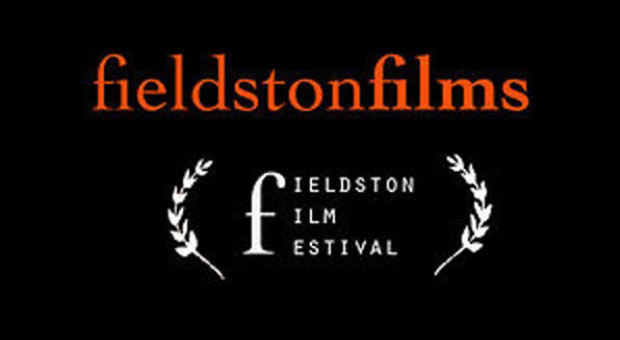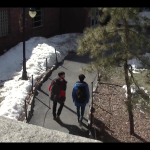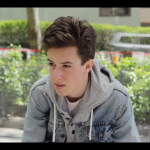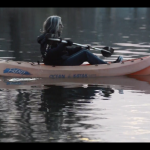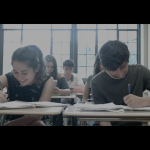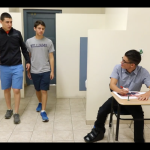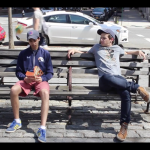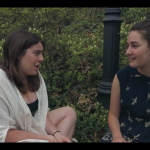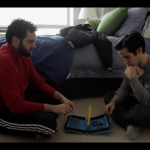While the 68th annual Cannes Film Festival kicked off in France, 3901 Fieldston Road hosted its very own. The ECFS Spring 2015 Film Festival, a genuine treasure, took place on May 12th and May 13th. Although there was no red carpet, and the only Reynolds in the audience was Kate, the Eagles held their own.
The festival was composed of three programs: program A on Tuesday and programs B and C on Wednesday. Program A, the “emerging filmmakers program,” was a compilation of videos made by the younger, beginner students. Program B was a series of films by intermediate students, and program C was works by older, more advanced film majors. The films featured in all three of the programs were extremely impressive.
I thought the most incredible thing to see was how people who didn’t know each other at all came together to help one another make the best film they could. I think that’s the best part of our film program; the willingness to help that everyone demonstrates.
The originality of the films was astounding. Students’ ideas were not stale or overused, but fresh, inventive, and creative. Subtraction, a sci-fi film by Grayson Cullen (III) had one of the most unique and unpredictable storylines featured in the festival. The film began with a conversation between two male high school students, in which one of them describes the new girl as “a five” compared to his status as only “a one.” Although it is initially tempting to typecast the movie as a stereotypical and slightly misogynistic portrayal of friendship between guys, the film soon takes a darker turn. The numbers the boy is assigning to his peers do not represent their attractiveness, but how dangerous they are. This plot twist cleverly plays with the mind of the viewer, manipulating our assumption for the expected in a very unexpected way.
Yesterday, by Sage Meadows (V), was another phenomenal piece of work. Meadows has tremendous potential as a filmmaker, especially in the horror genre. Yesterday follows a man and his wife over the course of three seemingly ordinary days. Initially, the audience member is made to assume that the man is crazy. His face is kept out of focus, he can’t remember what he did the day before, and he is so disoriented that he forgets his wife’s reminder to pick up their daughter from school. However, in the last scene, the man’s face becomes clear as he talks on the phone telling someone “Michelle, um, she’s kind of backslid again.” The film ends as the man grapples to understand what he can do to help his wife, and the audience is left with the heartbreaking realization that the man’s wife is crazy, unable to accept that their daughter has died.
The emotional depth that the students were able to reach and convey on the screen was another remarkable achievement. Ethan Hoffman-Sadka’s (VI) Salad is a haunting story of a high school senior who has just suffered the loss of his parents. His struggle to cope with his grief, and confront the future is conveyed with such real emotion that the audience becomes invested in his evolution. A particularly notable scene in Salad takes place after the main character has thrown a party and finds a naked couple in his late parents’ bed. His angry reaction, followed by his painstaking and somewhat obsessive efforts to perfectly remake the bed, reveal the internal grief that he is struggling to overcome. In a very tender and beautiful moment, he falls asleep curled up on the bed.
Sarah Sugg’s Amber was another triumph. The film was a thoughtful and painfully honest portrayal of high school relationships. Sugg (IV), who has taken film for three years, found inspiration in her own life, “What I created was fiction based off personal experiences and that really helped me to move past what happened, and find the closure I needed through film.”
The emotional depth that the students were able to reach and convey on the screen was another remarkable achievement.
The sophistication of the humor featured in many of the films was another testament to the skill of the students and the instruction of Larry Buskey. The Campaign, by Nicky Brussel Faria and Andrew Celli (IV), starred Michael Consuelos (V) as a quirky FSG campaign manager faced with the crushing reality that none of the candidates needed or wanted a campaign manager. The film was filled with funny moments and sharp dialogue including the particularly humorous line, “Do you know who was polling third last year? David Fishman. Do you know where he is now? He is the friggin secretary of technology. Let me help you.”
Not surprisingly, Jefferson Randall’s (V) Kinder was also a standout in the comedic category. Kinder tells the story of two 6-year-old best friends, navigating the obstacles of childhood friendship. The dialogue between the two friends was uproariously funny, as was Randall’s decision to cast two men in their early thirties to play the first graders. The performances were simply outstanding, striking the perfect balance between believable boyish naiveté and Woody-Allen-esque neurosis. The film is a feat of tremendous comedic ability that captures the challenges of childhood– the stress of setting up a play date, the shattering of Santa’s existence, and the loss of a friend–in a very mature, and relatable way.
The only disappointing aspect of this year’s film festival was its poor attendance. With only a fraction of the auditorium filled, this year was considered a good turn out. “I think that the film program is really respected at Fieldston and I wouldn’t say it’s underappreciated so much as under supported,” Sarah Sugg remarked. Theo Matza, a second year film student, echoed her sentiments, “I certainly believe that the film program is respected and appreciated by the students and faculty in our school. That is precisely the reason why I am puzzled as to why so many people don’t actually come to the festival.” In considering the reasons for low attendance Matza credited homework, “One potential problem may be the festival’s lengthy runtime. Although unrealistic, maybe if students attending the festival were to be excused from homework that night, I can almost guarantee that at least twice as many students would attend.”
What I created was fiction based off personal experiences and that really helped me to move past what happened, and find the closure I needed through film.
The film program is an example of Fieldston at its best. The commitment to hands on experience and student independence truly embodies the school’s mission. “The Fieldston film program is a really unique kind of experience and it’s unlike any class I’ve ever taken. We have so much freedom and opportunity to be creative and that’s really special,” reflected Sarah Sugg, “I thought the most incredible thing to see was how people who didn’t know each other at all came together to help one another make the best film they could. I think that’s the best part of our film program; the willingness to help that everyone demonstrates.”
Films from this year’s festival can be viewed at https://vimeo.com/user11954418

